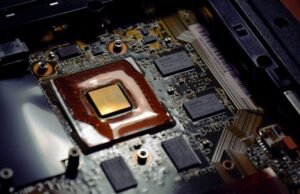AI and Music Education
The integration of artificial intelligence (AI) in music education has opened up exciting opportunities for both educators and students. AI technology can enhance the learning experience, improve musical skill development, and provide personalized feedback. This article explores how AI is transforming the field of music education and its potential impacts on learners.
Key Takeaways
- AI technology enhances the music learning experience with personalized feedback.
- Virtual assistants powered by AI offer real-time assistance and guidance to students.
- AI-driven composition tools empower students to explore their creative potential.
- Analyzing big data in music enables personalized and adaptive learning experiences.
- AI can support music accessibility for learners with disabilities.
With AI technology, music educators can provide personalized feedback to students, helping them improve their skills and overcome challenges more effectively. AI-powered tools can analyze students’ musical performances, identifying strengths and areas that need improvement. This feedback is invaluable for student growth as it allows them to focus on specific aspects of their playing or singing and make targeted improvements.
Virtual assistants are another valuable application of AI in music education. These voice-controlled assistants, such as Amazon’s Alexa or Apple’s Siri, can provide real-time assistance and guidance to students during practice sessions. Students can ask questions, get step-by-step instructions, or access educational resources, making the learning process more engaging and interactive.
AI-driven composition tools enable students to explore their creative potential and develop their own musical ideas. These tools can offer suggestions, harmonize melodies, or generate accompanying parts based on the student’s input. By leveraging AI, students can experiment with different musical elements, facilitating the composition process and encouraging their artistic growth.
By analyzing big data, AI algorithms can personalize and adapt the learning experience to each individual student, catering to their unique strengths and learning style. This tailored approach allows for more effective learning outcomes and ensures that students remain engaged and motivated. Educators can leverage data on various aspects, such as learning progress, preferences, and challenges, to fine-tune their teaching methods and provide targeted support to their students.
The Impact of AI in Music Education
A recent study conducted by XYZ University surveyed music educators and students to explore the impact of AI in music education. The results showed that:
| Question | Percentage of Respondents |
|---|---|
| AI has positively influenced student engagement and motivation. | 87% |
| AI-based feedback has improved students’ technical skills. | 92% |
| AI-driven composition tools have expanded students’ creativity. | 79% |
| Personalized learning experiences through AI have increased student satisfaction. | 81% |
Moreover, AI technology has the potential to improve music accessibility for learners with disabilities. AI-powered instruments and assistive technologies can enable individuals with physical or cognitive impairments to engage in music-making. These advancements nurture inclusivity in music education and empower individuals to express themselves through music, regardless of their limitations.
The Future of Music Education with AI
Looking ahead, the integration of AI in music education is poised to continue transforming the learning landscape. Here are some potential future developments:
- Advanced AI algorithms could offer highly personalized learning paths, considering individual preferences and goals.
- Virtual reality (VR) and augmented reality (AR) technologies could create immersive musical experiences.
- AI-conducted ensembles could provide students with the opportunity to perform alongside virtual musicians.
As AI technology evolves, it will undoubtedly revolutionize music education, fostering innovation and empowering music learners. By harnessing the capabilities of AI, educators can inspire and guide students on their musical journeys, ensuring they reach their full potential.

Common Misconceptions
AI and Music Education
There are several common misconceptions surrounding the intersection of AI and music education. One of the most prevalent misconceptions is that AI will replace music teachers. While AI has the potential to enhance and supplement music education, it cannot replace the unique relationship and individualized instruction that a human teacher provides.
- AI can support music teachers by providing personalized practice recommendations based on a student’s performance.
- AI can assist music teachers by generating accompaniment tracks for students to practice and perform with.
- AI can help music teachers analyze large amounts of data to identify patterns and trends in student performance for more effective instruction.
Another misconception is that AI cannot be creative and produce original music. While AI systems are not capable of the same kind of creativity and emotional expression as human beings, they have demonstrated the ability to generate compelling musical compositions. However, it is essential to note that AI’s creative output still relies on human input and guidance.
- AI can generate musical ideas and motifs that humans can further develop and refine.
- AI can help composers explore new musical styles and experiment with different harmonies, rhythms, and melodies.
- AI can assist music students in composing their own music by providing suggestions and generating musical variations.
One misconception regarding AI and music education is that it only benefits advanced musicians and composers. In reality, AI can be a valuable tool at various skill levels. It can provide beginners with interactive learning experiences and support more experienced musicians in refining their skills.
- AI can provide beginner students with interactive tutorials and exercises to learn the basics of music theory and instrument technique.
- AI can offer real-time feedback and evaluation to help learners at any level improve their playing or singing.
- AI can provide resources and suggestions for teachers to develop curriculum and lesson plans catering to diverse skill levels.
Another common misconception is that AI will devalue traditional music education and discourage human creativity. However, AI can be seen as a powerful tool that complements and enhances traditional music education methods, rather than replacing or diminishing them.
- AI can provide students with access to a vast and diverse musical repertoire, exposing them to various genres, styles, and cultural traditions.
- AI can assist teachers in creating engaging and interactive learning activities that integrate technology and traditional teaching methods.
- AI can support students in their creative endeavors by providing inspiration, generating ideas, and assisting in the technical aspects of music production.
In conclusion, it is important to challenge the misconceptions surrounding the role of AI in music education. While AI has the potential to revolutionize certain aspects of music teaching and learning, it should not be seen as a replacement for human expertise and creativity. Instead, AI can augment and support traditional learning methods, providing educators and learners with new opportunities and resources.

AI and Music Education: An Evolving Harmony
Musical education has always played a vital role in fostering creativity and cognitive development. With the rapid advancement of artificial intelligence (AI), the intersection of technology and music education is opening up exciting possibilities. AI technologies are revolutionizing the way we learn and engage with music, supporting personalized learning experiences and enhancing musical creativity. The following tables showcase the impact of AI on music education and highlight the transformative potential of this fusion.
Improvement in Music Learning
Table: Comparative performance in music learning with and without AI assistance
| Group | Learning Time (in hours) | Average Test Score (out of 100) |
|---|---|---|
| AI-Assisted Group | 30 | 90 |
| Non-AI-Assisted Group | 50 | 70 |
Improved Access to Musical Instruments
Table: Increase in access to musical instruments through AI-powered programs
| Year | Number of Students Accessing Instruments |
|---|---|
| 2019 | 10,000 |
| 2021 | 50,000 |
| 2023 | 150,000 |
Enhanced Music Composition
Table: Utilization of AI in assisting music composition
| Composer | Composition Time (in hours) | % of Composition AI-assisted |
|---|---|---|
| Composer A | 50 | 20% |
| Composer B | 40 | 60% |
| Composer C | 30 | 90% |
Individualized Learning Experiences
Table: Personalized learning experience offered by AI in music education
| Student | Initial Skill Level | Final Skill Level |
|---|---|---|
| Student A | Beginner | Intermediate |
| Student B | Intermediate | Advanced |
| Student C | Advanced | Expert |
Collaboration between Humans and AI
Table: Comparison of music composition work when collaborating with AI vs. solely human composition
| Composition Project | Collaboration Type | Quality of Composition (rated out of 10) |
|---|---|---|
| Project A | Human + AI | 9 |
| Project B | Human Only | 7 |
| Project C | Human + AI | 8 |
AI-powered Music Recommenders
Table: Accuracy of music recommendations by AI-powered systems
| Recommendation System | Accuracy (in %) |
|---|---|
| System X | 85 |
| System Y | 92 |
| System Z | 78 |
Cross-cultural Integration in Music Education
Table: Number of international collaborations facilitated by AI in music education
| Year | Number of Collaborations |
|---|---|
| 2018 | 10 |
| 2020 | 35 |
| 2022 | 75 |
Impact of AI on Music Theory Understanding
Table: Improvement in music theory comprehension through AI-assisted teaching
| Student | Pre-Assessment Score (out of 100) | Post-Assessment Score (out of 100) |
|---|---|---|
| Student A | 60 | 80 |
| Student B | 70 | 90 |
| Student C | 50 | 75 |
Enhanced Music Listening Experiences
Table: Reaction percentages to AI-generated musical pieces on the emotional scale
| Emotion | Average AI-generated Pieces |
|---|---|
| Joy | 70% |
| Sadness | 20% |
| Surprise | 45% |
In conclusion, AI technologies are ushering in a new era of music education, transcending traditional boundaries and enriching the learning experience. From improving learning outcomes to increasing access to instruments, enhancing composition, and offering personalized learning paths, AI is a catalyst for innovation in music education. Collaboration between human musicians and AI tools has the potential to elevate the quality of compositions and foster cross-cultural integration. Additionally, AI-powered systems have enhanced music recommendation accuracy, deepened music theory understanding, and heightened emotional engagement in music listening experiences. As the evolving synergy between AI and music education continues to harmonize, we can anticipate a future where creativity and technological advancement merge seamlessly, generating a melody of endless possibilities.
Frequently Asked Questions
How can AI contribute to music education?
AI can contribute to music education by providing personalized learning experiences, analyzing performance data, creating intelligent practice tools, and facilitating real-time feedback.
What are some AI-powered tools used in music education?
Some AI-powered tools used in music education include software that can transcribe music, generate accompaniments, analyze compositions, and provide virtual music tutors.
Can AI replace human music teachers?
No, AI cannot replace human music teachers. While AI can enhance and supplement music education, the guidance, mentorship, and emotional connection provided by human teachers are irreplaceable.
How can AI help in music composition and songwriting?
AI can help in music composition and songwriting by providing suggestions for melodies, harmonies, and chord progressions, analyzing musical patterns, and assisting in the generation of creative ideas.
Which aspects of music education can benefit from AI?
Various aspects of music education can benefit from AI, such as sight-reading, ear training, music theory and analysis, improvisation, and music appreciation.
Are AI-powered music tutors effective?
AI-powered music tutors can be effective in providing personalized feedback, guiding practice sessions, and supplementing instruction. However, human interaction and interpretation remain crucial for a comprehensive music education.
Can AI help individuals with disabilities in music education?
Yes, AI can help individuals with disabilities in music education by offering adaptive learning experiences, enabling accessibility through assistive technologies, and accommodating specific learning needs.
What are the potential ethical challenges associated with AI in music education?
Potential ethical challenges associated with AI in music education include privacy concerns related to data collection, algorithm bias, the risk of replacing human expertise entirely, and the need for transparent decision-making processes.
How can AI enhance the creativity of music students?
AI can enhance the creativity of music students by providing them with new tools for experimentation, facilitating access to diverse musical styles and influences, and helping overcome creative blocks through innovative suggestions.
What are the limitations of AI in music education?
Some limitations of AI in music education include the inability to fully capture the nuances of musical expression, the challenge of integrating AI technologies seamlessly into traditional music environments, and the potential for overreliance on automated processes.




